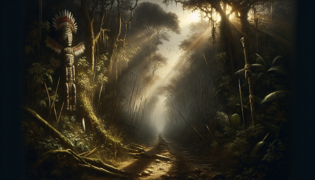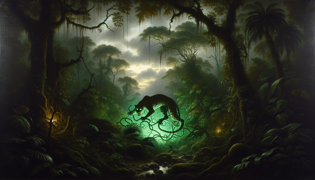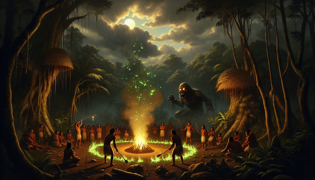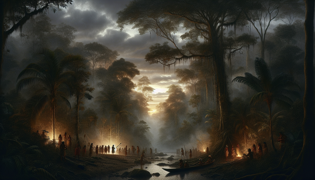Tonche: The Shape‑Shifting Demon of the Amazon
Reading Time: 11 min

About Story: Tonche: The Shape‑Shifting Demon of the Amazon is a Legend from brazil set in the Ancient. This Poetic tale explores themes of Nature and is suitable for Adults. It offers Cultural insights. A haunting legend of a demon that mimics voices to lure wanderers into the jungle’s heart.
Introduction
A breath of damp earth rose around Marisol as she stepped off the creaking canoe and onto the muddied bank. The river whispered secrets—some tongue she did not know. An oppressive hush wrapped the jungle, as if the trees themselves held their breath. Villagers had warned her, Eita, don’t heed voices that sound too close, they said. Yet curiosity, bright as a hummingbird’s wings, pulled her deeper beneath the canopy.
In the next instant, a crackle of insects exploded behind her, a staccato applause for unseen feet. The scent of resin and wet leaves was almost cloying, like an overturned basket of herbs. Somewhere in the gloom, Marisol thought she heard her brother’s voice calling . . . ‘‘Mariso?’’ So soft it could have been wind tumbling through fronds. Her heart quickened; ash-coloured clouds of doubt smudged her courage. Steam rose from the undergrowth, weaving around her ankles like phantom fingers. She swallowed, trying to steady her pulse, aware of every droplet that slid down her neck.
This stretch of river was said to be Tonche’s domain—a demon born when a restless spirit of vengeance fused with the hunger of the jungle. It could wear any shape: jaguar pelt gleaming with moonlight, or the lilt of a lover’s voice drifting on the air. Villagers claimed Tonche was old as the forest itself, older than the oldest cauim ceremony still sung at midnight. The warning was simple: stay on the path. But in the Amazon, paths seldom last. Moss crept over trail markers, and vines snatched them away.
Marisol gripped her satchel, the leather warm against her skin, each seam pressing like a heartbeat. She tested the stride of her boots in the wet clay and stepped forward. The dark twisted around her like black velvet, lit only by stray shafts of pale daylight. In that moment she felt both puny reed and resolute temple. Whatever lay ahead would require more than courage—it would demand every ounce of wit and faith she possessed. Somewhere beyond the next curve, in the tangled green twilight, Tonche waited.
Whispers Among the Palms
Marisol followed a narrow trail that wound between towering palms and strangler figs. The air was a sticky embrace, a steaming blanket that clung to skin and whispered of hidden decay. Cicadas droned overhead in a brutal chorus, broken only by sudden silences so deep you could hear your own blood thrumming. She paused when she heard a voice—a low, husky tone, so achingly familiar it made her bones vibrate.
"Mariso, over here..."
It came from just beyond a thicket of passiflora, the white petals trembling. Her pulse spiked. She brushed aside vines and found nothing but damp leaves and the crustacean snap of a fallen branch. She whispered, "Ai, meu Deus!" Wondering how the jungle could mimic her brother’s laughter. The foliage shivered, as if recoiling, then settled into stillness. The silence stretched like warm honey, viscous and cloying.
Every hair on her arms prickled. She tried to recall the shaman’s counsel: "Listen to the cicadas; when they pause, Tonche listens too." At that moment, the insects fell eerily silent. A stray beam of gaudy sunlight struck a broken branch, splintering like satin under her feet, and then, without warning, footsteps approached. She thought them too slow, too deliberate, more like the dragging pelt of a great cat than any human stride. The faint tang of resin mixed with the sharp sting of fear. She knew then that Tonche toyed with her, weaving half‑truths from familiar sounds.
In the distance, she spotted crude totems of bone and feather—markings villagers had carved to warn travellers. Yet somehow they felt weakened, as if the jungle had swallowed their power. Marisol crept closer. A flicker of movement caught her eye: a cluster of feathers, trembling. She closed her hand around the hunting knife at her waist. The blade’s hilt was smooth as river-worn boulder, reassuring in her palm. For a heartbeat, the forest held its breath. Then an owl hooted, and the spell broke. She exhaled, determined to push on. Each step was a vow, to prove that she would not be baited by old demons, no matter how seductive their guises.

The Shifting Form
She recalled her grandmother’s stories of Tonche: a spirit born of betrayal, bound to the jungle until it claimed as many souls as stars in the Milky Way. It prowled in the guise of beasts or voices, guiding the curious astray. Marisol had always shrugged at such lore, until now. Every shadow seemed to ripple, as though it breathed. A breeze stirred behind her, bringing with it the faint musk of wild cacao blossoms—sweet and unsettling.
Marisol’s footsteps echoed on a stone slab, half-buried in moss. She crouched to trace the carved runes: spirals like untwisted ferns. A shiver swept through her as cicadas erupted in a thousand-throated cry. The sound was so loud it rattled her senses. Yet beneath the din, she heard another call—this time a low growl, deep as thunder rolling in distant hills. Her skin prickled, goose-flesh rising on her arms like dew.
The underbrush parted in a slow hush, as if welcoming a guest. Marisol gripped her knife and peered through the greenery. There, poised on twisted roots, stood a jaguar. Its fur shimmered in blotches of gold and charcoal, eyes gleaming with unnatural intelligence. Her breath caught—she had seen jaguars before, but never one that seemed to watch her so knowingly. Panic flickered in her chest. The creature cocked its head, a disdainful tilt that sent a wave of icy dread through her veins.
She raised her knife in timid defence. Before she could blink, the jaguar’s form melted like candle wax, transforming into a tall figure cloaked in dripping foliage, its skin the colour of dark bark. It bore her brother’s face, contorted in a cruel smile. "You shouldn’t have come," it said, voice a rasp of leaves rustling. Marisol forced herself to stand tall. "Show yourself," she said, voice steady despite the tremor beneath.
The figure laughed—a hollow sound that echoed through the trees. "I am every lost word, every broken promise, every wandered soul. I am Tonche." The name slithered into her blood. A pulse of green light flared from its chest, illuminating the clearing with the sickly hue of toxic blooms. Marisol braced herself. This was no mere beast but a demon wreathed in the very heart of the forest’s wrath. She steadied her resolve: to defy Tonche was to defy the jungle’s darkest heart itself.

Ritual of the Shaman
Marisol fled, heart pounding like ceremonial drums. Twigs snapped underfoot—each crack a thunderclap in the silent jungle. She headed for the shaman’s hut, guided by distant smoke curling skyward. The pungent smell of burning palo santo cut through the damp air, grounding her. When she reached the clearing, torchlight danced on carved skull masks hung from poles. Father Cauã stood solemn beside a simmering brazier of charcoal and herbs. His eyes were deep as river pools.
"Eita, child," he whispered. "You’ve seen him. Tonche grows bold." He tended the fire, dropping in bright orange seeds that hissed like startled birds. The flames flared, casting wild shadows. "Drink this," he said, offering a gourd of bitter brew scented with jaguar’s nail fungus and guaraná. The first sip was a shock—a burnt peat tang that left her tongue numb. She coughed but forced the liquid down. In moments, colours deepened, sounds sharpened.
The shaman drew a circle in white clay and beckoned her inside. He chanted in an ancient tongue that rolled like river rapids. The ground beneath them thrummed, harmonising with her pulse. Around the clearing, villagers formed a ring, eyes solemn. Each clutched a torch that sputtered with greenish sparks. The breezes carried their whispered prayers, a tapestry of voices.
A sudden crack of thunder made them all pause. From the treeline, Tonche emerged—its form flickering between beast and human, vines trailing like soaked hair. The demon’s grin was a slash of shadow. The shaman’s chant rose to a tremolo, and the circle glowed faintly. Marisol felt warmth coil around her ankles, a protective ward of clay and earth. Tonche tilted its head, curiosity gleaming in its unnatural eyes.
Then the shaman raised his blade—an obsidian knife etched with ancestral runes. With a single, fluid motion he slashed the air, and the ward flared, forcing Tonche back. The demon shrieked, a sound like splintering wood, then dissolved into a swirl of hummingbirds and petals. The villagers exhaled in unison, relief washing over them like rain after drought. Marisol sank to her knees, the bitter taste still lingering, but under it, a spark of triumph. They had faced the shape‑shifter together, proving that unity and time‑honoured rites could tame even the darkest spirits of the forest.

Light Beyond the Canopy
When dawn spilled its pale fingers through the canopy, the world felt altered. The night’s terror had retreated, leaving dew‑beaded ferns that blinked in the new light. Marisol stood at the riverbank, the canoe’s hull wet and dark as a raven’s wing. The scent of water lilies drifted on the current, crisp as fresh linen.
The villagers gathered in hushed reverence. They had emerged unscathed, and the jungle seemed to sigh, its oppressive weight lifting. Father Cauã approached. "Tonche is bound for now," he said, voice soft like moss falling on stone. "But the forest remembers. Respect her, and stay rooted in tradition."
Marisol’s gaze followed the river’s winding course. Reflections of green and gold shimmered, alive with memory. She nodded, feeling the weight of something vast settle gently in her chest—responsibility, yes, but also awe. Every leaf was a testament to endurance; every insect a hymn to survival. The forest was both cradle and crucible.
She turned to the villagers. "We’ll rebuild the markers," she promised. "Carve fresh runes and place new totems. Keep the tale alive." Their faces warmed with gratitude, and somewhere a macaw gave a high, raucous call, as though offering applause. The air smelled of damp earth and promise, a heady blend.
As she pushed the canoe into the current, she glanced back at the thick green wall. A single pair of eyes glowed briefly among the vines, watching her depart. Not hunger this time, but something wilder—curiosity, perhaps, or respect. Marisol touched the knife at her waist and whispered into the morning: "Farewell, Tonche—but stay wary of wonder." The river received her words and carried them away, toward distant horizons and new stories waiting beneath the emerald canopy.

Conclusion
Marisol’s journey through the Amazon lingered in her memory like a vivid dream. The jungle, once an inscrutable labyrinth, became a living archive of tales—some whispered by cicadas, others carved in bark. Tonche, the shape‑shifting demon, retreated into the folds of legend, a cautionary echo on the wind. Yet every rustle of leaves, every distant howl, reminded her that the spirit remained alive in the dance of light and shadow.
Back in her village, she shared the story around flickering hearths. Elders nodded, children widened their eyes. The runes were recut on fresh bark; totems of bone and feather adorned every path. With each telling, Tonche’s cautionary figure grew wiser, more nuanced: not merely a phantom to dread, but a guardian of boundaries that man must honour.
Her grandmother’s grin was wide as the Amazon itself. "You did well, menina," she said, offering a cup of sweet açai brew. The earthy aroma rose in graceful spirals. Marisol realised that the greatest power lay not in shattered wards or obsidian knives, but in stories—living things that breathe purpose into ritual. Like vines anchoring the tallest tree, memories tethered them to the past and guided them forward.
In time, travellers spoke of a woman who had walked into the heart of the jungle and returned unclaimed. They passed markers embellished with fresh pigments, humming the old chants. And on moonless nights, when the cicadas fell silent, they listened closely—just in case Tonche was softly calling them home.

















